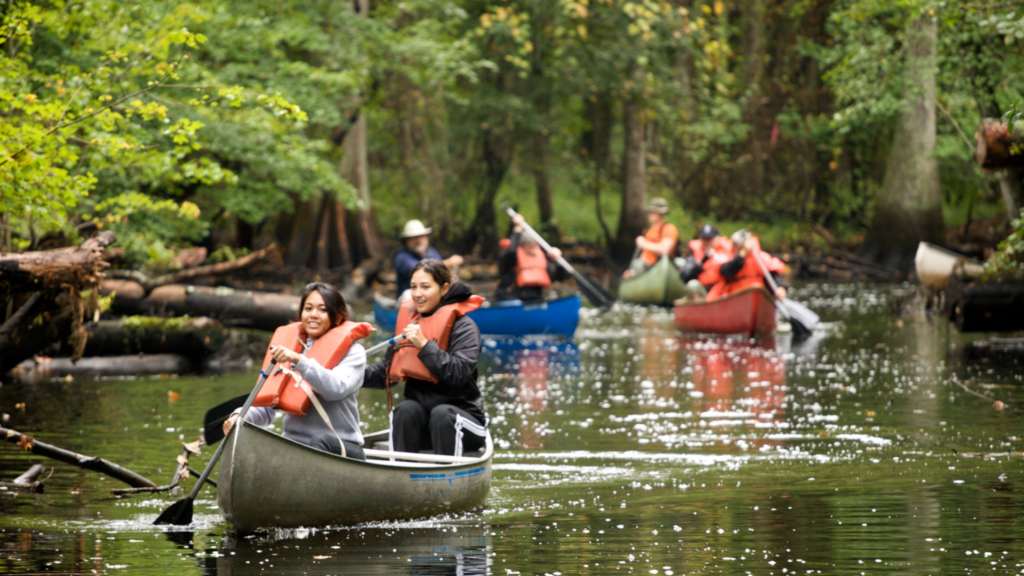Many of us on parish catechumenate teams have been stuck in a school mindset for far too long. We’ve gotten comfortable with the school model — where there are teachers and students, a defined curriculum, and a clear beginning and end to the process. But Pope Francis is calling us to embrace a new paradigm, one that sees us not as teachers, but as accompanists on a sacred journey.
The pope says the culture we live in today is in crisis. We suffer from an anonymity that isolates us, yet we also have an unhealthy obsession with the details of other people’s lives that leaves us feeling disconnected and unsatisfied. Our challenge as catechumenate teams is to “make present the fragrance of Christ’s closeness and personal gaze” (Joy of the Gospel, 169). And to do that, we need to learn the art of accompaniment.
As I wrote about in Seek the Living God: Five RCIA Inquiry Questions for Making Disciples, I experienced this shift firsthand when I joined a new catechumenate team. At our first meeting, the discussion centered on who would teach which pre-catechumenate topics, from “The Existence of God” to “The Church.” The inquirers would all receive textbooks and be expected to attend the same 10-week series of classes, regardless of their individual backgrounds and needs.
But as I got to know some of the inquirers, I realized just how diverse their spiritual journeys were. There was Bill, an evangelical Protestant drawn to the depth of Catholic spirituality. Kevin, an ex-convict and recovering addict, had been attending Mass with his Catholic wife for years. Adhi, a nominal Buddhist, showed up three weeks after classes started, and some of the team members wanted to ask him to return next September. And then there was Alice, the fiancée of one of our parishioners. She didn’t believe in God, but her fiancée’s grandmother insisted Alice had to be Catholic to marry her Catholic boyfriend.
Clearly, the one-size-fits-all school model wasn’t going to work for these individuals. Each of them needed a different kind of accompaniment, one that recognized the sacred mystery of their unique paths.
The school model: A chokehold on the catechumenate
The school model prevents us from learning the art of accompaniment. According to Archbishop Rino Fisichella, president of the Pontifical Council for Promoting New Evangelization, parishes that are defaulting to a school model for the catechumenate need to undergo “a ‘pastoral conversion’ in order to free catechesis from some chokeholds that prevent its effectiveness.”
The school model presumes there are teachers and students — experts and non-experts. The teachers are the ones with the knowledge, while the students are empty vessels waiting to be filled. This dynamic inherently creates a power imbalance and a sense of hierarchy.
The school model also presumes a defined curriculum that must be covered within a set timeframe — a “school year” with a clear beginning and end. There’s an assumption that everyone needs to learn the same content, in the same order, on the same schedule. But the reality is that each person’s spiritual journey is unique, and they will progress at different paces.
In contrast, Pope Francis is calling us to a new way of forming missionary disciples — one that sees us not as teachers, but as accompanists on a sacred journey. Accompaniment is a spiritual process that calls for “prudence, understanding, patience, and docility to the Spirit” (Joy of the Gospel, 171).
There’s an assumption that everyone needs to learn the same content, in the same order, on the same schedule. But the reality is that each person’s spiritual journey is unique, and they will progress at different paces.
The spirituality of accompaniment
Accompaniment is not just a methodology or a set of best practices — it’s a spirituality, a way of being in the world that is rooted in the example of Jesus himself. When we embrace the art of accompaniment, we’re participating in the life of the Trinity, in a sacred dance of mutual self-giving.
As we learn the art of accompaniment, we start to recognize that each person is a sacred mystery, filled with the grace and gifts of God. Our role is not to impose our own agenda or expertise, but to listen deeply, to walk alongside, and to help facilitate the unfolding of God’s work in their lives.
This requires a profound humility and openness on our part. We have to let go of our need for control, our desire to have all the answers, and our tendency to make assumptions. Instead, we need to enter into a posture of humble openness and presence, allowing ourselves to be transformed even as we accompany others.
The art of listening
At the heart of the spirituality of accompaniment is the art of listening. This is more than just hearing the words that someone is saying — it’s an openness of heart and mind that allows us to truly encounter the other person and to discern the movements of the Spirit in their lives.
Listening in this way requires a deep humility and a willingness to set aside our own assumptions and preconceptions. It means being fully present to the person in front of us, without trying to fix or control the situation. It’s about creating a safe and sacred space where people feel heard, understood, and valued.
When we listen with this kind of attentiveness, we open ourselves up to the possibility of a genuine spiritual encounter. We create the conditions for the individuals we accompany to respond fully to God’s love and to bring to fruition what God has sown in their lives.
The mystery of each person’s journey
As I got to know the four inquirers in my parish, I realized that each of their situations was a sacred mystery. Bill, the evangelical Protestant, had a deep spirituality and prayer life that had already led him far along the path of readiness to be received into the full communion of the Catholic Church. On the other hand, Adhi, the nominal Buddhist, was going to need a lot more preparation. While he had a deep understanding of the church’s commitment to the poor, he did not know the source of that commitment, and he had little understanding of the worship life of the church. Kevin, the ex-convict and recovering addict, was somewhere between Bill and Adhi on the journey. He had been participating in Mass with his Catholic wife for years, but had never been baptized. And Alice, the fiancée who didn’t believe in God, really wasn’t interested in embarking on a journey of faith at all.
Recognizing the uniqueness of each person’s journey is essential to the spirituality of accompaniment. A person who is good at accompaniment realizes that each person’s situation is a sacred mystery (see Joy of the Gospel, 172). We can never fully know the depth and complexity of another person’s life, or the ways in which God has been working in their heart and mind long before we ever met them. Our role is to approach each encounter with a profound sense of reverence and respect, and to walk alongside them with patience and care.
When we listen with attentiveness, we open ourselves up to the possibility of a genuine spiritual encounter. We create the conditions for the individuals we accompany to respond fully to God’s love and to bring to fruition what God has sown in their lives.
Invitation to wholehearted commitment
As we learn the art of accompaniment, we’re called to a radical commitment to the process of conversion, which is the ultimate goal of the catechumenate journey. This is not a superficial or half-hearted endeavor, but a wholehearted commitment to the slow, steady work of the Holy Spirit in the lives of those we serve.
If we have been enmeshed in the school model, this will require a profound shift in our mindset and our approach to parish ministry. We have to learn to walk alongside others, even when the path is not clear, and even when the progress feels painfully slow. It means being present to the struggles, the doubts, and the moments of darkness, without trying to fix or control the situation.
But if we’re willing to stay the course, to trust in the slow, steady work of the Spirit, and to cultivate a deep well of patience and compassion, we just might find that we’re participating in the ongoing, miraculous work of transformation that is central to the gospel.
Can you help me out?
I’d love to know how this is landing. Can you share a word or a phrase about how this article resonates with you? Does it speak to your experience? Share your thoughts in the comments box below. Thanks for being part of the conversion!


















Sounds very hard and messy. But we live in a messy Church. It requires of us much more than just knowledge and perhaps the catechists are not the best choice for accompaniment . Isn’t that what the sponsors are for?
Hi Patricia. I agree that this ministry can be hard and messy at times. But that’s true about the best things in our lives a lot of times — especially when it comes to relationships with others. Pope Francis said we have to take on the smell of the sheep. By which, I think he meant that we cannot be catechists from afar. We have to be walking alongside our seekers, accompanying through all the ups and downs of their journey of faith, sharing in their joys and their pains. It is certainly a role for their sponsors, but it is no less important for catechists to be accompanists as well. I wrote a series of articles on what the church teaches about the ministry of the catechist that you might be interested in: https://teaminitiation.com/tag/ministry-of-catechist/
Also, this book goes into detail about how to involve the entire parish in the ministry of accompaniment: https://teaminitiation.com/presents/best-books/ypitc/
Blessings on all the great work you are doing!
Well stated. Early in my years as a catechism I was blessed to have heard that our job was not to teach the faith, it was to allow people to rub up against us as we journeyed together. It was much more fun this way. It was usually them asking questions about the church or the readings or life from a Catholic perspective and us exploring for answers together. Little preparation needed, lots of humility and a sense of humor.
Hi Bill. Love the image of allowing people to rub up against us as we journey together! Thanks for sharing your thoughts and for your commitment to this ministry.
Thanks Nick. You sound like you have been in our parish. We have a similar collection of candidates and while this is the first year I served on the team, the mindset of teachers and curriculum is also similar. We have been asked to accompany the candidates but this is only a minor role and I was appointed five which I could hardly keep up with each—a high school graduate, a masters level student, a truck driver, a business manager and a fiancée.
Hi John. Wow that sounds like a lot. I’m sure the team and your parish will benefit from your commitment. I hope you are able to find some fellow accompanists to help you with your ministry. Thank you for all your good work.
Perfect. You have summed up what we have been thinking for the last 10 years of our 30 year RCIA history. Of course, we are meeting moderate, some times strong, headwinds as we implement this very old, very successful, method of opening minds to the world of “NEW”. I just recently visited a 1740 schoolhouse in which was inscribed the founders directive, “Teach less, learn more.” We’ve been using this philosophy which you so eloquently explained for just three years. It has been not only100% effective but not surprisingly as much of a faith journey for us, the RCIA TEAM, as it is for the people who come to us. We now begin our relationship with the new people with the words, “Welcome to our community. We are happy that you have invited us to join your journey of faith.”
It works.
Tom
Thanks Tom. I love “teach less, learn more!” Blessings on your ministry.
As someone who was immersed in the “school model” of RCIA, looking for the right materials to use with inquirers/catechumens/candidates, it was a challenge – and a relief – to move into accompaniment. The biggest difficulty for our parish is building our team so that we can journey more effectively with each person.
Hi Cathy. Thanks for stepping up to meet the challenge. I pray that as you continue to build your team, the Holy Spirit will send you more accompanists to support you in your mission. Keep up the good work!
I believe this article is so spot on. I, too have been on RCIA teams that have missed the message of accompaniment. As you mentioned in the beginning regarding the inquirers, I’ve been on teams that have intentionally overlooked and/or don’t truly asses the varying backgrounds, experiences or lack thereof, etc., of each inquirer and just lump everyone into one pile and “let’s start our program.”
The spirituality of accompaniment is so vital and key in the entire faith journey within the RCIA. Jesus Christ is our ultimate role model in the accompaniment journey. He didn’t just teach, but he deeply listened with great sincerity, dignity, compassion and charity to the lives of the twelve and all those who encountered him. And upon hearing what they shared, Jesus addressed each one as to who it pertained too. Why? Because each of us have our own stories, both life and faith.
So many times I’ve encountered RCIA teams in various parishes and the program of classroom teaching and students were just not doing it IMHO. But very sadly, many continue to be content and satisfied with this format. And then wonder why some new Catholics have drifted away.
So much thanks for sharing this very valuable lesson and reiterating what Pope Francis has called us to do. I pray that many will embrace it so that their ministry can truly produce much good fruits.
Thank GP. I’m glad you found the article helpful. As you point out, Jesus is, indeed, our ultimate role model. If we keep that truth in mind, we will be doing the work the church asks us to do. Thank you for your commitment.
excellent article that challenged me. How would you go about the accompaniment? Would each team member accompany one person?
How would the group come together? Would they be received into the
Church individually ? Also the diocesan regulations would enter into
this process.
Great questions! I don’t think there is one definitive model. Each seeker is different, and every parish is different. Some team members might only be able to accompany one person at time. Some team members might be able to accompany several seekers. Some seekers might require a “mini-team” of accompanists. Some seekers might be received into full communion individually, and some who the Holy Spirit has guided on a similar trajectory might be received as a group. If you read through some of our articles on discernment, you will start to get a sense of how to know when folks are ready to take the next step: https://teaminitiation.com/category/discernment/
Hi Nick, thank you so much for this article. As many of the workshops and articles I am affirmed of what I am doing with our OCIA family. I was so luck to have a pastor 12 years ago that was a part of Sheri Weddell’s Making Disciples and he sent his formation teams for three summers with Sheri in Cold Springs Colorado. That experience changed our OCIA, the school method was gone and we have been fellow journey people with our folks. What you have shared is so true. The Seekers are not the only ones transformed. Blessings on your ministry to all of us. Sr. Joyanne
Hi Sr. Joyanne. I’m glad you found the article helpful. I am so glad to hear about your story and the transformation of your parish’s ministry to the seekers. Blessing on all the great work you are doing.
Thank you for all you do. Theory is great. What does this look like in real time with a group of 20 participants and a team of 5? We have some unbaptized seeking full initiation; some baptized Catholics seeking completion of sacraments of initiation; some Christians baptized in a different tradition seeking full communion with the Catholic Church.
What are team members doing when they accompany? In our process we have weekly catechesis topics of discussion. We try to promote a dialogue to encourage seekers to think about and consider their response to the topic; we go to Mass together as a group, break open the Word together as a group with individual reflections; we do service projects together as a group; retreat with lots group and individual reflection; prayer experiences. We work to facilitate encounters with Christ and rely on the Holy Spirit to bring about the conversion. I’m not sure how we could/should change what we do.
Hi Alice. Your question gets at the heart of practical implementation, and the way you described your current process seems to reflect a lot of what the church envisions for spiritual accompaniment. To answer your question about what you might change, you might take a look at your weekly topic structure.
If you want to provide genuine spiritual accompaniment for your seekers, you might ask: Do these topics emerge organically from the seekers’ lived experiences in the parish and liturgy, or are they pre-determined beforehand? An accompaniment model suggests that discussions would arise from the actual journey of the seekers, reflecting their real-life encounters with Christ in the community.
The Order of Christian Initiation of Adults doesn’t mandate weekly meetings. While weekly gatherings can be beneficial if a parish has the resources, the catechumenate is fundamentally a year-round process of accompaniment. Formal weekly meetings aren’t a requirement — what matters is continuous, intentional spiritual accompaniment.
Your current approach already offers many elements of accompaniment:
• Attending Mass together
• Breaking open the Word
• Participating in service projects
• Creating retreat and prayer experiences
• Facilitating dialogue and reflection
The Directory for Catechesis affirms that the Christian community is the “origin, locus and goal of catechesis.” Your team can lean into this by:
• Listening deeply to seekers’ stories
• Helping seekers connect their experiences to faith
• Modeling missionary discipleship
• Creating space for the Holy Spirit’s transformative work
The subtle shift is viewing these activities not as a structured program, but as opportunities for genuine spiritual accompaniment. Team members walk alongside seekers, helping them discover Christ’s presence in their everyday lives.
Consider these questions:
• Are your discussion topics emerging from the seekers’ actual experiences?
• Could you reduce formal meeting frequency and increase organic, as-needed accompaniment?
• How might you more intentionally connect parish life, liturgy, and seekers’ personal journeys?
This article might be helpful if you’d like to read more: https://teaminitiation.com/2015/05/how-to-use-your-parish-as-your-rcia-textbook/
Also, you might want to see this book: Your Parish Is the Curriculum: https://teaminitiation.com/presents/best-books/ypitc/